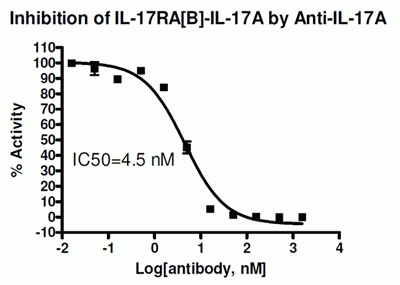IL-17 is mainly secreted by a specific subset of T helper cells known as TH17 cells. The IL-17 cytokines mediate their biological functions via surface receptors on target cells. IL-17A binds to IL-17 receptor A (IL-17RA), which stimulates the production of other pro-inflammatory cytokines including IL-6 and IL-8. IL-17A and its receptor play a pathogenic role in many inflammatory and autoimmune diseases such as rheumatoid arthritis. IL-17 signaling is also involved in mucosal immunity and host defense against extracellular bacterial and fungal infections (Staph, Candida, Pneumonia, etc.).
The IL-17A pathway is a key target for immunotherapies. The first therapeutic antibody that inhibits IL-17A signaling was approved by the US Food and Drug Administration (FDA) and the European Medicines Agency (EMA) for the treatment of psoriasis in 2015. Numerous pharmaceutical and biotech companies are developing biologics that target this pathway – for example, Amgen's IL-17 receptor-specific antibody, brodalumab and Eli Lilly's IL-17A-specific monoclonal, ixekizumab. In addition to psoriasis, IL-17 signaling is important in many other autoimmune and inflammatory diseases, including psoriatic and rheumatoid arthritis, Crohn's disease, multiple sclerosis, and ankylosing spondylitis.
BPS Bioscience now offers IL-17A and IL-17RA proteins, the neutralizing (inhibiting) IL-17 antibody, and a unique IL-17RA:IL-17A Inhibitor Screening Assay Kit designed for screening inhibitors of IL-17A:IL-17RA interaction. The kit takes advantage of biotin-labeled IL-17RA to detect protein-protein interaction via Streptavidin-HRP and chemiluminescent detection in the same manner as other protein-protein interaction assays supplied by BPS, such as PD-1:PD-L1 and PCSK9-LDLR. It provides researchers with a useful tool for screening small molecules or antibodies to block IL17A:IL17RA interactions.




